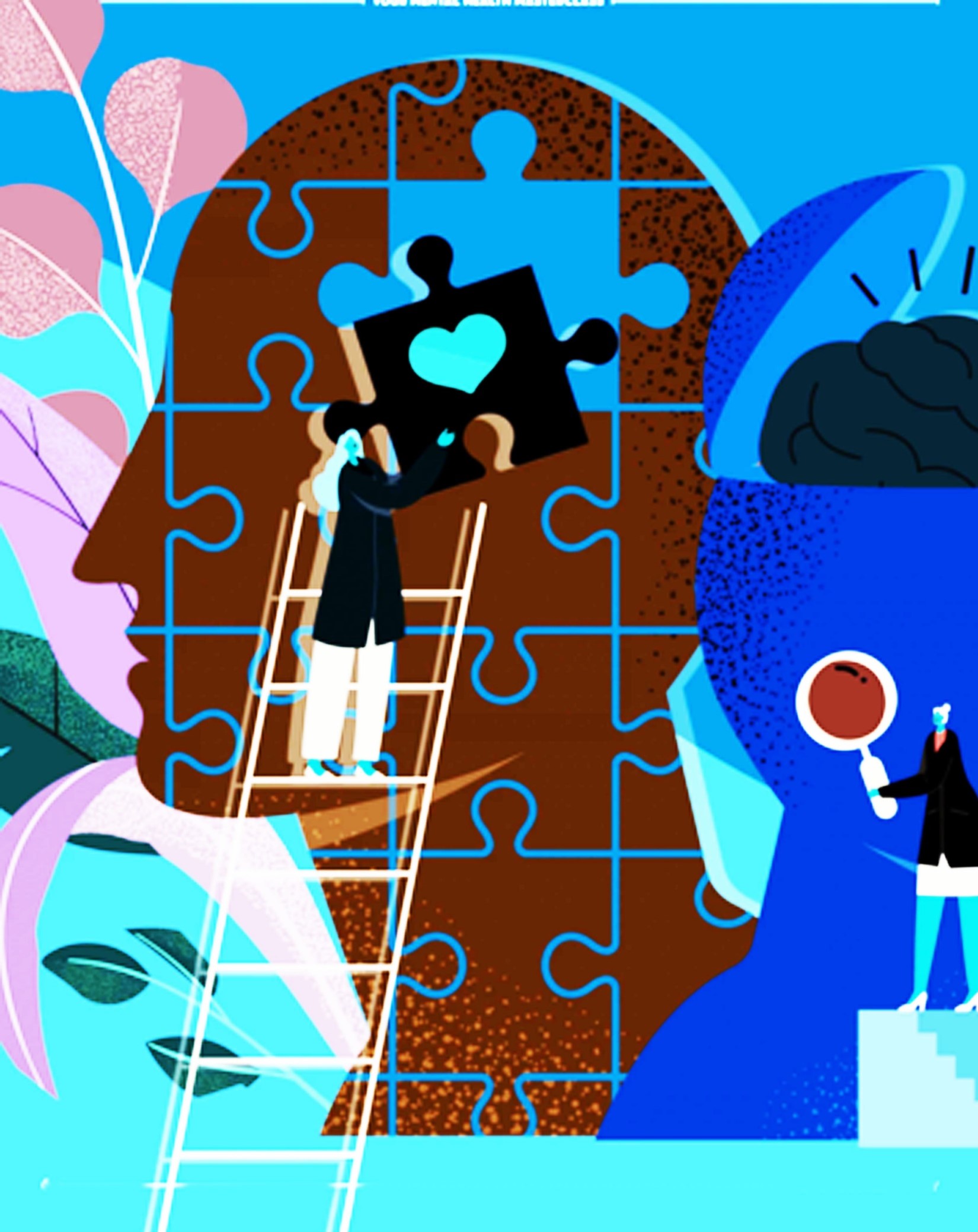By Yin Nwe Ko
“We look after our physical health, but our emotional well-being often gets neglected. It’s time to make it a priority.”
Despite a staggering one in four people in the UK experiencing a mental health problem each year, the invisible nature of it means there’s often a tendency to ignore problems and just get on with it. But, as Stephen Buckley, head of information at mental health charity Mind, says, “Mental health is just like our physical health: everybody has it, and we need to take care of it.”
He adds, “Thankfully, we’ve seen the national conversation on mental health move forward, but those with mental health problems still face barriers.” The topic remains taboo, especially for older generations – a YouGov survey revealed that 25 per cent of over-55s think it’s more difficult for them to discuss mental health than younger people. Some 71 per cent felt this was because, in the past, anxiety and depression were seen as weaknesses rather than health conditions.
ROAD TO RECOVERY
These figures are no surprise, especially after the recent pandemic. But it’s how we deal with it that’s important. Thankfully, there are things we can do. “Eating healthily, sleeping well, exercising, and seeking help are all key,” says Stephen. “Different treatments work for different people, and the journey to recovery won’t always be easy.” Here, Mind shares its advice on three common mental health issues.
DEPRESSION
What is it?
In its mildest form, it means being repeatedly in low spirits – at its most severe, it can be life-threatening, making you feel suicidal.
The impact?
Symptoms can include “feeling low, numb, worthless or without hope,” says Stephen. “You may sleep too much or too little and withdraw from social contact.”
Help yourself
List activities, people, and places that make you feel good, and try to find ways to bring these things into your daily routine.
Do something new
This can boost your mood and break unhelpful patterns of thinking. You could try volunteering – it makes you feel better and less alone. Try self-help. Explore cognitive behavioural therapy.
ANXIETY
What is it?
Feeling anxious is a natural response when we feel under threat. But if you regularly experience anxiety, including strong panic attacks, which last a long time and are difficult to control, you may need help.
The impact?
You avoid situations that may make you feel anxious. You’ll find it hard to go about your everyday life or do things you enjoy.
Help yourself focus on breathing, especially during a panic attack. Inhale through your nose and out through your mouth, counting from one to five.
Try complementary and alternative therapies, including meditation, aromatherapy, massage, yoga, and reflexology, to aid relaxation.
OBSESSIVE-COMPULSIVE DISORDER (OCD)
What is it?
An anxiety disorder with obsessions (unwelcome thoughts, urges, and worries that appear in your mind, making you feel anxious) and compulsions (repetitive activities to reduce anxiety, such as checking a door is locked or repeating phrases)
The impact?
You might avoid situations that trigger it, including work or seeing friends or family. You may feel ashamed of your thoughts or feel the need to hide your OCD.
Help yourself
Talk to someone you trust or write down feelings to discuss together.
Learn to relax
Manage stress and try techniques such as deep breathing or mindfulness.
Try peer support
This brings together people who have had similar experiences. It helps you feel accepted and confident.
NO MORE FEELING ANXIOUS!
Millions of us are experiencing anxiety often without even realizing it. Most of us probably think we know what anxiety feels like. Your heart races, you’re short of breath, and your body is bathed in a sheen of sweat. But there are plenty of hidden signs, too. Follow this advice on how to spot the hidden signs and do something about it.
“Anxiety is what we feel when we are worried, tense, or afraid,” says Nicky Lidbetter, CEO of Anxiety UK. It can be caused by several factors, including feelings of uncertainty, physical health problems, stress, and childhood experiences. It’s thought that around three million people in the UK have an anxiety disorder, and while clammy hands and a pounding heart could signal anxiety, some signs are less obvious. Here are the more subtle symptoms to look out for:
YOU OVER-DRAMATIZE SMALL FAILURES
“There’s a catastrophizing nature to anxiety that makes you perceive things being much worse than they actually are,” says Nicky. If you’re overdramatic, you may have an over-the-top reaction to a small failing, which could lead to a meltdown or cause you to stay at home for the next few days, unable to face the world.
YOU’RE CRITICAL OF YOURSELF AND OTHERS
“Being anxious leads to you being hard on yourself. It thrives on the lack of self-esteem you have for yourself, and, as a result, you become self-critical and critical of those around you,” says Nicky.
YOU CAN’T SLEEP
When we’re in an anxious state, it can be hard for our body and mind to relax, and we can have trouble sleeping, which can lead to bouts of insomnia.
YOU’RE DISTRACTED
“We may be preoccupied with our thoughts and easily distracted,” says Nicky. Experiencing racing thoughts is common with anxiety, but this attention to the ‘inner dialogue’ can result in others perceiving us as distant.
YOU OVERTHINK
“When you’re anxious, you’re desperately trying to make sense of a situation. Overthinking and labouring over every eventuality is a way of protecting yourself and gaining control,” says Nicky.
YOU’RE AFRAID TO TAKE RISKS
Sticking to your ‘comfort zone’ means you won’t have to face frustration, embarrassment, sadness, anger, or disappointment – all extreme feelings for someone with anxiety. “When we are anxious, we want to protect ourselves and can see risks as threats, so we become risk-averse,” says Nicky.
YOU TALK TOO MUCH
You may be ‘high-functioning’ when you’re anxious, meaning your mind is going at 100 mph. As a result, your actions – such as talking a lot – may follow suit.
YOU’RE UNWILLING TO MAKE FRIENDS
Opening yourself up emotionally can make you feel vulnerable and exposed. You may already be imagining losing that friendship before it’s even started. “Anxiety may isolate us by way of protecting ourselves from unknown territory,” says Nicky.
YOU FEEL UNWELL
Constant anxiety has a big effect on the immune system, and trying to hide symptoms from others can impact physical health. “Anxiety can make us tired and even sick. Plus, adrenaline released can harm our stomachs, as well as other parts of the body,” explains Nicky.
When it’s more serious
Seek additional help and support if anxiety is disrupting your day-to-day life and stopping you from doing activities you previously enjoyed.
SHORTCUTS TO SERENITY
These quick tips can help, so make sure you practice them daily:
A person who feels they are not worth listening to will speak quickly because they don’t want to keep others waiting on something not worth listening to.
A person in authority speaks slowly; even if you don’t feel very confident, try slowing down and see how it feels.
Too much to do? Write down each task you can’t do right now on a separate piece of paper. Then, every other day, take a random one and do it. You’ll soon get through the list.
Learn to recognize negative self-talk (I can’t run anymore, I’ve got to stop). Visualize it as an irritating bug, stamp on it, kill it, then replace it with a positive one (‘Come on, I can do this! Only half a mile left!’).
Laugh often. Watch a funny film or a YouTube video and have a good belly laugh. Science shows it helps to lower the stress hormone cortisol and can shift a low mood.
You are what you do, so if you change what you do, you change what you are. Act in a positive way. Take action instead of telling yourself you can’t. Positively talk to people. You’ll soon start to notice a difference.
If you choose to say ‘no’ to something, mentally rehearse the conversation beforehand, saying it simply and directly, giving no more than one key reason. Do not get into explaining or arguing: just repeat ‘No, because…’ quietly and firmly.
Before always saying ‘yes’ to demands, take a deep breath so you can touch base with yourself to discover what you would truly, honestly, prefer to do.
Have a list of useful apps that benefit your mental health. Try Headspace, Stress & Anxiety Companion, and Catch It.
Don’t aim too high. Set a goal you know you can achieve, then achieve it. You’ll feel good. Now, set another and achieve that. Soon, you’ll be setting bigger goals and achieving those, too.
Visualize yourself at your most confident, then link this feeling to a physical action, such as pinching your thumb and forefinger together. Next time you need to feel confident in a situation, pinch your thumb and finger together to get back to that positive mental state.
Keep talking. Having a chat with a loved one, sending a text to a friend, or asking your colleague to go for a walk is the best tonic for a low mood.
Standing tall and straight makes you feel better about yourself. Imagine a piece of string pulling the top of your head towards the sky, and the rest of your body straightens accordingly.
Immerse yourself in nature. So-called ‘green therapy’, being outdoors is a powerful mood-lifter. A Stanford University study showed that a 90-minute walk in nature reduced ruminations, which is a risk factor for mental illness.
In brief, taking care of our mental health is just as important as looking after our physical well-being. Despite the invisible nature of mental health issues, it is crucial to prioritize and address them. As the head of information at mental health charity Mind, Stephen Buckley emphasizes the need to break the taboo surrounding mental health, acknowledging that everyone has mental health that requires care. The road to recovery involves various strategies, including healthy habits, seeking help, and understanding common mental health issues like depression, anxiety, and OCD. By recognizing hidden signs of anxiety and adopting simple daily practices, we can work towards improving our mental well-being. Remember, seeking support and taking positive actions can make a significant difference in our mental health journey.
Reference: Live Yourself Happy














